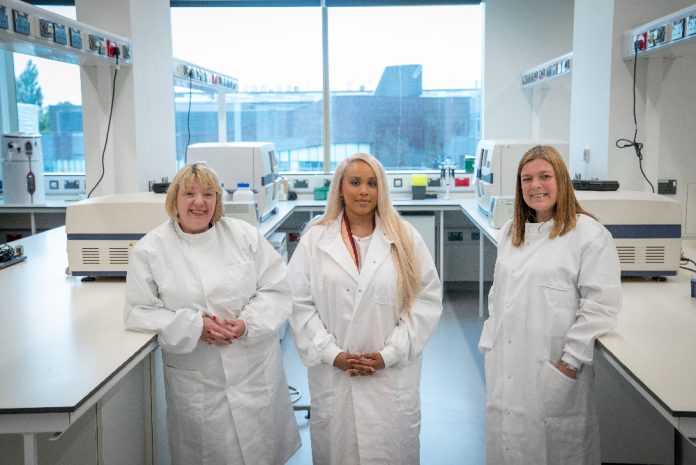CANCER survivors had a sneak preview of pioneering work at the Cancer Research UK
National Biomarker Centre ahead of its official opening.
The state-of-the-art facility will help experts detect cancer at an earlier stage – when
there’s more chance of a cure, anticipate how aggressive a patient’s tumour is, predict
which treatments are likely to work best, and monitor responses to personalised
treatment.
Biomarkers encompass a plethora of different tests that enable clinicians to manage a
patient’s individual cancer in the best way possible.
Cancer Research UK will invest £2.5m into the National Biomarker Centre each year as
part of an annual £26m investment in Manchester – putting the city at the heart of its
mission to beat cancer.
Every year around 44,700 people are diagnosed with cancer in the North West.
The opening has been welcomed by three individuals from Greater Manchester, each of
whom owes their life to the power of cancer research.
Asia Sharif, who lives in Manchester city centre, has just been given the momentous news
that she is cancer free after being diagnosed with stage 4 Hodgkin lymphoma last year.
The 26-year-old Natwest software engineer had chemotherapy at The Christie and her
eggs frozen to preserve her future fertility.
She said: “Last year was gruelling and I’m now delighted to be recovering and getting my
life back on track. Being able to see direct the work which will help future patients is
fascinating and inspiring.”
Carolyn Hall, from Whitefield, had just celebrated her 40 th birthday and her youngest child
was aged four when she was diagnosed with breast cancer. Carolyn, now 52, had a
mastectomy and reconstructive surgery. She also underwent chemotherapy at The
Christie. Carolyn is married to Stuart, with children, Lily, 16, and 20-year-old Charlie. She
runs her own business Total Venues.
She said: “As a patient treated at The Christie who
has gone on to support Cancer
Research UK for many years, I am delighted to have a sneak preview of the work at the
National Biomarker Centre and find out what the future of research holds.”
Sharon Quennell, from Chadderton in Oldham, was diagnosed with breast cancer in 2000
at the age of 36 after noticing a lump on her left breast. She underwent surgery followed
by 12 weeks of chemotherapy treatment.
Now 60, she will celebrate a quarter of a century free of cancer next year. Sharon works at
North Manchester General Hospital and is a single mum to Ryan, aged 29, who has autism
and learning disabilities.
She has previously visited the laboratories in the Paterson Building and said:
“I am always humbled to hear about the amazing research work happening in Manchester. Having a look at the National Biomarker Centre before the official opening is so exciting.”
The Paterson Building is also home to the Cancer Research UK Manchester Institute, part
of The University of Manchester.
Prof Caroline Dive is Director of the National Biomarker Centre and Interim Director of the
Cancer Research UK Manchester Institute. She knows only too well the impact of cancer.
Her grandfather died from brain cancer before she was born. Her mother has undergone
surgery on an endometrial tumour, and her father was treated for colon cancer. He
passed away aged 95 years-old, following a further diagnosis of cancer.
Professor Caroline Dive said:
“The impact biomarkers will have on patients' care can't be underestimated.
Doctors will be able to get more information, faster, to determine the best
treatment plan for each individual. And it will stop some patients from undergoing
unnecessary interventions or treatments that could cause pain or discomfort
without providing benefit. We are learning how to manage cancer. And that will
mean we can give patients longer with their loved ones and a good quality of life."
Cancer Research UK’s chief executive, Michelle Mitchell, who will attend the official
opening on Friday June 14, said:
“As the world’s largest charitable funder of cancer research, Cancer Research UK
is at the forefront of the global fight against the disease, bringing together millions
of people who share our determination to beat it.
“As a former student of The University of Manchester, I’m delighted that such an
exciting and revolutionary facility will be housed in the city. Research at the Cancer
Research UK National Biomarker Centre will help to transform cancer treatment in
the future.”







